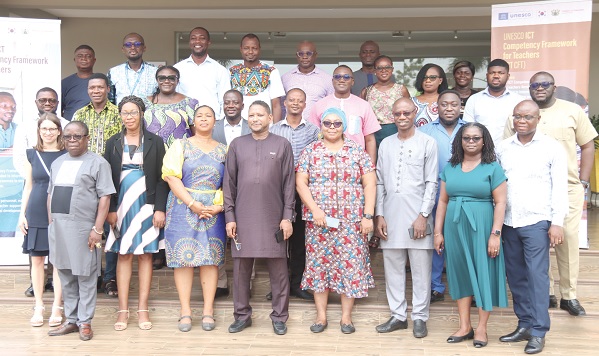
Work on ICT framework for teachers commences
AN Information and Communications Technology (ICT) competency framework for teachers, organised by the Ministry of Education (MOE), has commenced.
Advertisement
The process, which started with a stakeholder engagement in Accra, was attended by representatives from the Centre for National Distance Learning and Open Schooling (CENDLOS), the National Council for Curriculum and Assessment (NaCCA), the National Council and Tertiary Education (NCTE), the National Teaching Council (NTC) and the Ghana Education Service (GES).
Participants shared ideas on how to effectively implement the framework.
Framework
The purpose of the framework is to define specific competencies and ICT skills that are essential for educators at the primary and secondary levels to acquire in line with international best practices.
The project is supported by the United Nations Educational Scientific and Cultural Organisation (UNESCO), through the Korea Funds-in-Trust project - ICT transforming education in Africa.
When the framework is set in motion, about 500 learners would have access to free, quality assured curriculum and other digital resources while about 500 teachers would also have access to educational resources from online platforms.
Also, 300 in-service teachers would be trained in offline and emergency remote teaching in pilot schools, ICT in education policy and strategy documents, including braille, which would be revised, validated, printed and distributed.
Significance
The UNESCO Representative in Ghana, Abdourahamane Diallo, said the framework would play a role in coordinating and unifying ICT professional development opportunities for teachers and also serve as a guide for the development of in-service and pre-service training programmes.
"This exercise will set the standard for the development of competencies and ICT skills that the country’s educators at the primary and secondary levels must possess.
“ICT has become an integral part of our daily lives and its impact on education cannot be overstated.
"With the increasing availability of digital tools and resources, it is critical that teachers possess the necessary ICT competencies to support effective teaching and learning," he added.
Mr Diallo also expressed the hope that the framework would contribute to ongoing efforts to enhance the quality of education in the country.
"We are excited about the potential impact of the project because it is essential for the attainment of the Sustainable Development Goal 4, which seeks to ensure inclusive and equitable quality education and also promote lifelong learning opportunities for all," he added.
Writer's email: [email protected]



